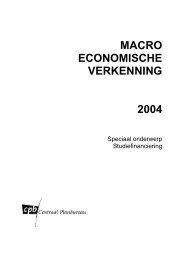CPB Newsletter
CPB Newsletter
CPB Newsletter
You also want an ePaper? Increase the reach of your titles
YUMPU automatically turns print PDFs into web optimized ePapers that Google loves.
2009 March/April 3Smoking, drinking and gambling: regulation ismore important than excise-duty increasesTaxes play an important role in restraining excessivesmoking, drinking and gambling. But complementarypolicies in the form of direct regulation also have a meaningfulrole to play in finding the right balance betweenconsumer sovereignty and reduction of external costs.IntroductionSmoking is the single largest cause of avoidable death in the EuropeanUnion. One in ten of all 11-year olds have been drunk atleast twice. Electronic gaming machines are the crack cocaine ofgambling, while Internet gambling is virtually immune to regulation.Despite the negative aspects of the above-mentioned “vices”, theprinciple of consumer sovereignty implies that people should beallowed to follow their own pursuits (smoking, for example), aslong as they do not harm others. There is sound medical evidence,furthermore, that a drink each day keeps the doctor away. Recreationalgambling can be an enjoyable form of entertainment formany people. These and other salient facts form the backgroundfor a <strong>CPB</strong> study that analyses the taxation and regulation ofsmoking, drinking and gambling.Valuation of welfare gains and lossesIn any analysis of the effects and social costs of smoking, drinkingand gambling, the gains from a reduction in harmful consumptionshould be balanced against the welfare loss suffered by adultsmokers, moderate drinkers and leisure gamblers. In light of theconsumer sovereignty principle, the main issue is to restrain theconsumption carried out by young people who are insuffi cientlyinformed about the dire consequences of their behaviour or whodiscount the short-term effects of abusive consumption at a higherrate than the long-term effects.How far should smoking be curtailed?There is much uncertainty about the external costs of passivesmoking, which may be lower than is often thought, particularlyafter the introduction of bans on smoking in public places. Thesame applies to the net health costs: the healthcare costs thatare saved as a result of the early death of smokers (who do notincur the socially costly expense of old-age ailments) should bededucted from the gross costs caused by their behaviour.The correct application of the economic external cost principleshows that the excise yield of a pack of cigarettes is often higherthan the costs of smoking. This seems to provide an argumentfor holding back on general measures that would further curtailsmoking. On the other hand, the decision-making process ofsmokers is often non-rational: they later regret their earlier habitand in hindsight appreciate the restrictions placed on their behaviourby the government. This provides an argument for focusinganti-smoking policies on this group—mainly the young— amongother things through the excise duty instrument.How to restrain alcohol abuse?Alcohol abuse is an important health and safety issue in Europe.Yet the alcohol excise is a rather blunt instrument to restrain alcoholabuse: the consumption of heavy drinkers is not reduced(because alcoholics cannot control their behaviour), and the welfareof moderate drinkers is reduced. Therefore, regulatory measuresaimed at specifi c problem groups, such as young peopleand heavy drinkers, should complement the excise instrument.Cost-effective measures that have a demonstrably positive effecton alcohol abuse include restrictions on the sale and purchaseof alcohol, coupled with server legal liability rules for sellers ofalcoholic beverages to minors and drunken people. The Dutchcampaign to discourage drunk driving may do more harm thangood by suggesting that fellow-passengers may be stone drunk—so long as the driver is sober.Can gambling still be taxed?High gambling taxes reduce the welfare of non-addicted playerswithout restraining the behaviour of problem gamblers. Taxes ongames of chance, such as lotteries, disproportionately burdenlower-income groups, while the revenues often benefi t culturalevents, which benefi t higher-income groups. In the present situation,gambling addicts can exercise their habit unrestrained anduntaxed on the internet, while recreational non-addicted casinovisitors have to pay a high price to wager an occasional bet. Accordingly,a minimum level of protection for problem gamblersmay be more effective than a minimum level of taxation on gamesof chance.More information: sijbren.cnossen@cpb.nl


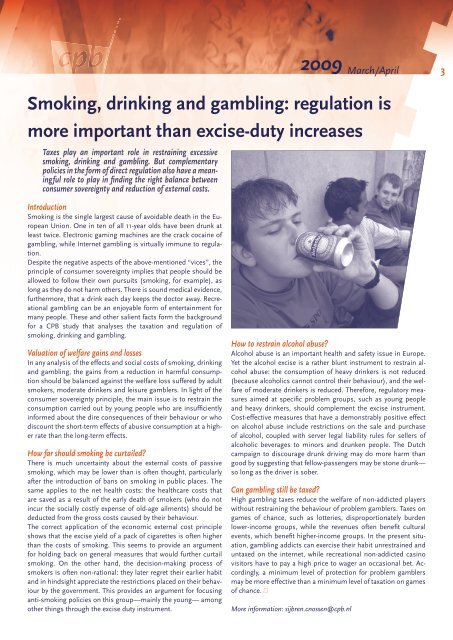
![[PDF] Financiering van wetenschappelijk onderzoek in ...](https://img.yumpu.com/49055623/1/184x260/pdf-financiering-van-wetenschappelijk-onderzoek-in-.jpg?quality=85)
![[PDF] Centraal Economisch Plan 2011](https://img.yumpu.com/47582807/1/184x260/pdf-centraal-economisch-plan-2011.jpg?quality=85)
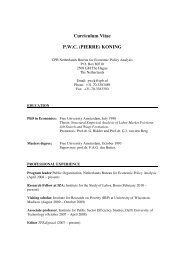
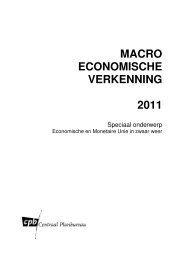
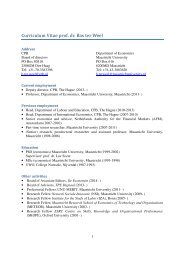
![[PDF] Lacunes in vaardigheden in de EU](https://img.yumpu.com/41714460/1/184x260/pdf-lacunes-in-vaardigheden-in-de-eu.jpg?quality=85)
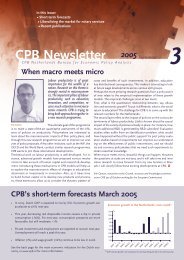
![[PDF] Invloed WWB op gebruik bijstand - Centraal Planbureau](https://img.yumpu.com/36528547/1/184x260/pdf-invloed-wwb-op-gebruik-bijstand-centraal-planbureau.jpg?quality=85)
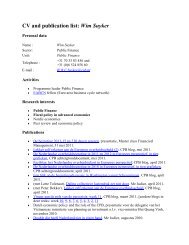
![[PDF] Presentatie](https://img.yumpu.com/32939500/1/190x143/pdf-presentatie-saffier-iiquot-centraal-planbureau.jpg?quality=85)
![[PDF] De arbeidsmarkt van de zorgsector: data en modellen](https://img.yumpu.com/30597900/1/184x260/pdf-de-arbeidsmarkt-van-de-zorgsector-data-en-modellen.jpg?quality=85)
![[PDF] Karen van der Wiel](https://img.yumpu.com/28631171/1/184x260/pdf-karen-van-der-wiel.jpg?quality=85)
